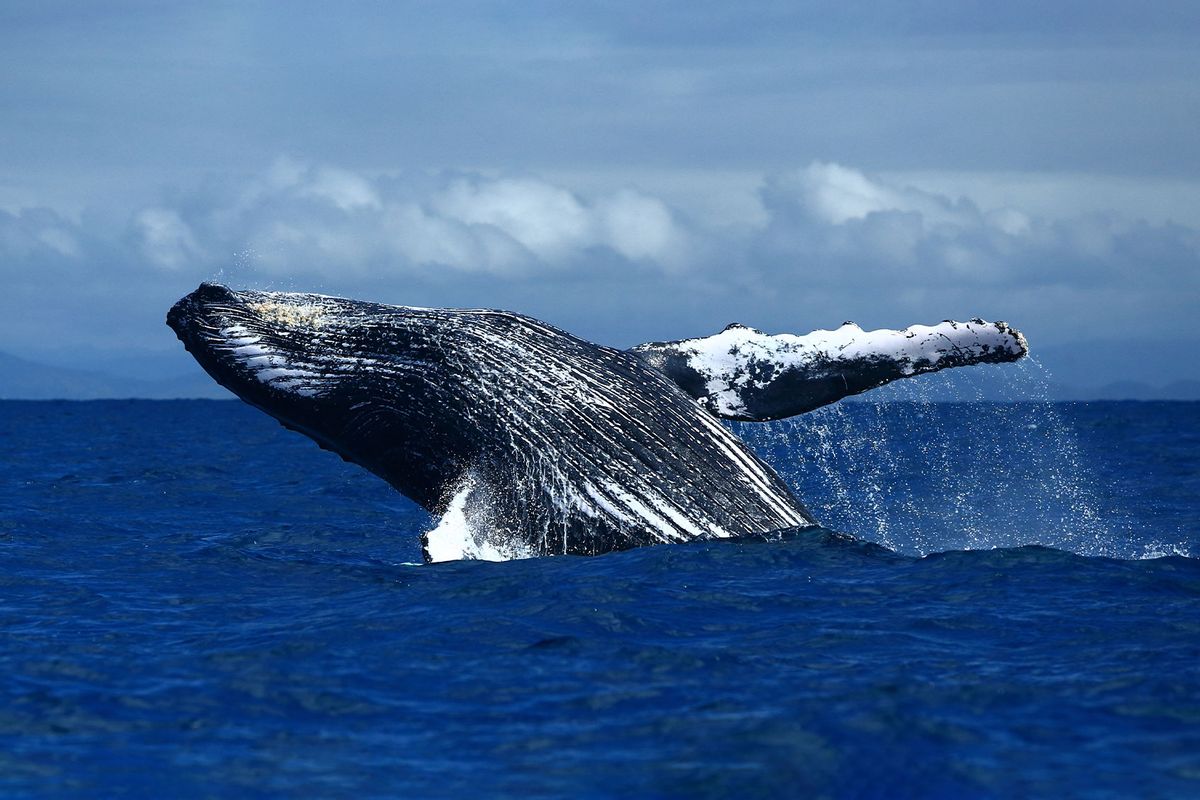Last February, hundreds of protesters filled the boardwalk in Point Pleasant Beach, New Jersey, carrying signs that read "Save the Whales." While the activists appeared to be well-intentioned — North Atlantic Right Whales on the East Coast are currently facing extinction — the protest was actually calling for a moratorium on wind farm construction. The protestors cited misinformation that wind turbines are killing whales, a narrative that has been a prominent talking point on right-leaning news channels like Fox News, as Salon previously reported. New Jersey is in the midst of building its first offshore wind project, which will consist of 98 turbines about 15 miles off the coast of Atlantic City and Ocean City.
Yet a new study adds to a growing body of evidence that wind turbines aren't causing whales to die at all — suggesting that the aforementioned activists are, in fact, tilting at windmills.
However, a recent study published in Proceedings B, the Royal Society's premier biological research journal, presents further evidence debunking this misinformation. The findings suggest that wind surveying for wind farms aren't the culprit; rather, boats are the major threat to whales. This tracks with scientists' observations in recent years.
In the study, researchers utilized an acoustic array of hydrophone buoys to record the whales' songs, which are predictable sounds used by humpbacks to communicate with each other. The researchers then introduced a 19-meter fishing boat to generate boat noise and observed the reactions of the whales to both the boat noise and wind noise.
The findings indicated that the humpback whales responded by singing louder in the presence of noisy wind above the ocean, but they did not exhibit the same reaction to the boat engines. This suggests that whale communication may not have adapted to human boats, and could be disruptive to how they communicate with each other.
"Humpback whales evolved over millions of years with noise from natural sources, but noise from man-made vessels is foreign to their instincts," lead author Dr. Elisa Girola said in a media statement. "It's a surprising finding given engine noise has a similar frequency range to the wind."
Girola speculates that despite the similarity in frequency between wind noise and boat noise, the whales might be discerning nuances in the wind's noise. In other words, this study contributes to the growing body of evidence indicating that anthropogenic noise, also known as noise pollution caused by human activities, may have a negative impact on whale communication.
"We don't know yet if this lack of response to boat noise is making whales communicate less effectively or making breeding practices more difficult," Girola said. "Male humpback whale singing is probably used to mediate reproductive interactions, but we can't say if vessel noise is interfering."
Indeed, it's plausible that the humpback whales are using another form of communication to compensate for the vessel noise.
Want more health and science stories in your inbox? Subscribe to Salon's weekly newsletter The Vulgar Scientist.
"Even with a 19-meter boat making a racket, the whales just didn't sing any louder," Girola said. "There are a few things going on – they might be using 'spatial release from masking', which is the ability to discriminate between audio signals coming from different directions."
Further research is necessary. Although the study didn't aim to directly refute the misinformation around wind turbines killing whales directly, it adds to evidence that ships are the real threat. In other words, that suggests that those who are attacking wind turbines as the source of whale deaths are mistaken.
"It is more information that follows in that same fact pattern that is the folks that are jumping to these conclusions about turbines killing whales are not supported by by evidence," Gib Brogan, campaign director at ocean conservation nonprofit Oceana who was not involved in the study, told Salon.
Since 2016, both humpback whales and north Atlantic right whales in the Atlantic Ocean have experienced an "unusual mortality event," or UME, according to the National Oceanic and Atmospheric Administration (NOAA). Under the Marine Mammal Protection Act, a UME signifies there is a significant die-off of any marine mammal population that requires an immediate response. In February, the National Oceanic and Atmospheric Administration (NOAA) stated that an uptick in humpback whales deaths are due to humpback whales being struck by ships or being entangled in fishing gear.
"As the Gulf of Maine stock of humpback whales continues to grow, more young animals are choosing to overwinter along the Atlantic coast where they are vulnerable to being struck by ships and becoming entangled in fishing gear," NOAA stated in a report. "Despite several reports in the media, there is no evidence to link these strandings to offshore wind energy development."
Brogan said boat vessels are a "persistent threat" to whales.
"Whales that have to come to the surface to breathe put themselves in danger because that's where the boats are traveling," Brogan said. "And very often the whales are swimming slowly, and when they spend time at the surface that puts them at risk of being hit by the boats, and we're very concerned about the vessel strikes, particularly with North Atlantic right whales, but also with humpback whales."
While more research is needed, the researchers of the most recent study note that it's possible human-made noise is interfering with whale communication.
Certainly wind turbines are no strangers to conspiracy theories, but as researchers continue to hopefully the one between the whales and windmills can be put to rest.
Read more
about whales and wind



Shares